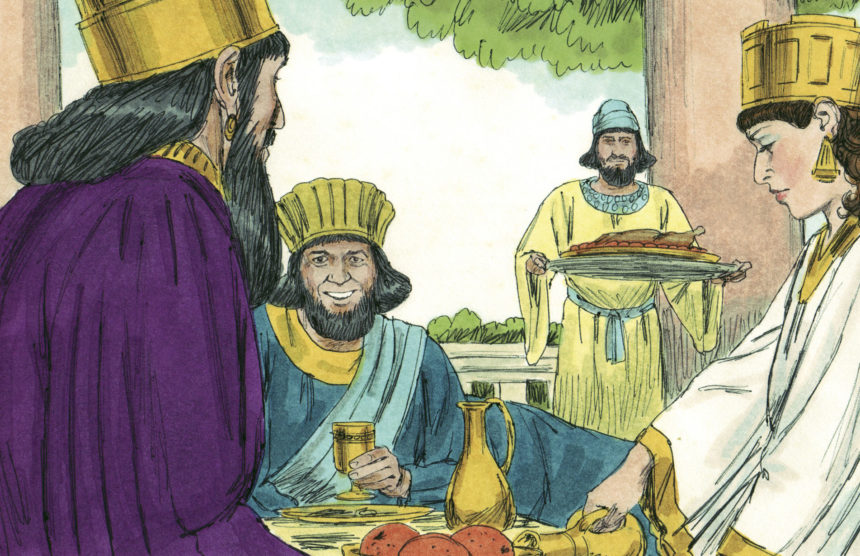Bible Study
Esther Chapters 5:9-7:10 (NLT)
Esther is a book full of banquets. There are at least six banquets in the book. It was at a banquet where the king’s anger burned to the point that he dismissed his first queen (1:10-19), at a banquet Esther celebrates receiving her crown (2:18) and at a banquet where Queen Esther risked that same anger to save her people (7:1-3). It’s as though the copious amounts of banquet food and wine fuel the story. Around the banquet table, the fortunes of the main characters rise and fall.
In the New Testament, Jesus describes his kingdom as a banquet (Luke 14:15-24). Who are the people we want in our inner circles, around our banquet tables, in our churches? Are there those who are being invited only to be paraded around like Queen Vashti? The token and the talented who we only wish to use as long as they go along with our programs and plans. Who are the kings of the banquet halls known for throwing the most lavish parties? Those are the people we want to see and with whom we wish to be seen, but there are others who are forgotten and cast aside. Where is Mordecai? People who are locked out of the banquet because of their nationality or race. Are there people like Haman? Those who leach onto the banquets of others and who gleefully eat while the world around them is crashing down (3:15). Those who have no concern for the lost or marginalized or worse those who believe that the lost and marginalized deserve to be locked out of the places of privilege and power. Are we even interested in Esther’s banquets? She throws banquets of change which turn the tables and impact the world around her.
The difference between Esther’s approach to change and the approach most often employed is striking. The king offers “half the kingdom” and Esther replies with deference – “If I have found favor with the king, and if it pleases the king to grant my request” (7:3). Although she occupies a position of power, queen, and has already demonstrated her worth by sharing with the king an assassination plot (2:22), Esther relies on none of it in making her request. She refuses to use leverage to get her way with King Xerxes. She is not feeding the king on the condition that he honors her request. Are we doing good things because those things are good or are the good things we do merely linked to what we hope to be the response in someone else? Our programs and good works might be more effective if they were not tainted with self-promotion and a thinly veiled attempt to curry favor.
Furthermore, Esther chooses her battles wisely. Esther would not have bothered the King if her people were merely enslaved (7:4). Her request is literally a matter of life and death. It is a fool’s errand to attack every attitude and action which does not arise from a Biblical worldview or runs counter to church dogma. It robs us of joy and makes us appear to be judgmental and angry. The church’s message of love and forgiveness has been drowned out by a chorus to “dos and don’ts.” Perhaps one of the reasons that Xerxes listened to Esther is because she chose silence until she could remain quiet no longer.
Finally, Esther allowed Haman’s actions to speak. Mordecai assured Esther that deliverance for the Jews would come whether she acted or not. God would not allow his people to be destroyed and since Haman’s actions are against God and God’s people, it will be impossible for him to last and for his plans to succeed. When the time came, the King saw Haman for what he was. Even Haman’s attempt to literally throw himself on the queen’s mercy backfired (7:8). If we are trying see change in our world, it’s important for us to know that if what we want to see done is from God, God will see it through. Deliverance will come. Change will happen. It will be impossible for those like Haman who want to see harm to God’s kingdom and people to succeed.
Like Esther, we are called to serve, to invite others to God’s banquet and we are not always sure of what the final outcome of our service will be. We should take comfort in the fact that deliverance will come. The Hamans of this world will be defeated and God’s kingdom, God’s plans will be realized. In the meantime, our job is to trust and to be true to our calling, to keep inviting others into God’s banquet and to keep patiently and humbling making our requests.
QUESTIONS:
- Who are the people we are inviting to the banquet (the Kingdom)? Are there groups that we are ignoring or leaving out of our Kingdom efforts?
- Given what we know of Esther’s approach to change. How might this inform our own approaches to change? What can I do for a friend or a neighbor without attaching strings? How can I clearly discern when God is calling me to action and when he is asking me to be patient?
- Am I faithful and patient with God’s timing?

